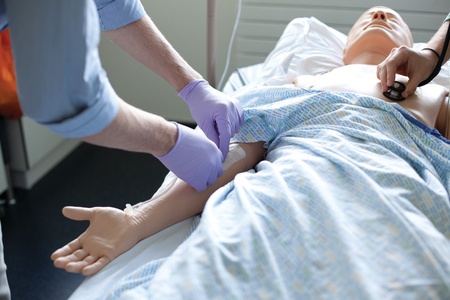The first students have been accepted to a new course that gives the most promising secondary pupils from rural areas and less advantaged backgrounds a unique opportunity to study medicine in Aberdeen.
Places are still available on the course, which is a joint initiative by the University of Aberdeen and North East Scotland College (NESCOL).
Young people from less advantaged or more remote areas in Scotland may face barriers to a career in medicine, for example some schools may not be able to offer all the subjects required in one year for standard entry to medicine. There may also be challenges in accessing work experience opportunities.
Twenty students will be admitted to the Gateway2Medicine (G2M) programme which will give them both the experience and qualifications needed to study medicine at university, starting in autumn 2017.
The course has been developed by NESCOL and the University of Aberdeen in order to help deliver a sustainable workforce for the future of the NHS and to meet Scottish Government targets to widen access to higher education.
Currently, a disproportionately low number of students from less advantaged backgrounds study medicine in Scotland. Programmes such as G2M are designed to ensure that pupils from such areas have the same opportunities as everyone else.
The Commission for Widening Access has set a target that by 2030 students from the 20% most deprived backgrounds should represent 20% of entrants to higher education in Scotland.
As long as they satisfy the relevant academic criteria, students from SIMD areas (areas of multiple deprivation as calculated by the Scottish Government) will be eligible to apply to the course, as will those who have been in residential, foster or kinship care.
Students from outwith these categories must meet at least three criteria from a determined list - one of which is if students live in very remote or rural areas. This is in recognition of the additional challenges pupils and parents in remote and rural contexts face to visit and engage effectively with medical schools. Also, because poverty and deprivation are more spatially dispersed than in rural areas it is difficult to use the same methods that calculate deprivation in urban areas.
Josh Shaw, a final year medical student at the University of Aberdeen, attended Dingwall Academy, which has since become one of the schools included in the University’s Reach Programme. Pupils from Reach schools applying for Law or Medicine are given additional support by the University.
“I always wanted to study medicine. However, I had to do a lot of the work myself,” Josh says. “It’s no criticism of my school but I have spoken to classmates from schools that were more used to sending students to medical school and they got more assistance with interviews and coaching on how to make their personal statements look good. I did get assistance from my own school but it wasn’t specifically tailored to applying for medicine. Because it’s such a competitive course to get onto, everything about your application has to be polished.
“Living in the Highlands also impacts work experience opportunities because Raigmore Hospital covers the whole of the Highlands, whereas if you’re in Glasgow, for example, there are a lot more hospitals where you could potentially get placements.
“Away from the practicalities, I think the whole range of society needs to be represented in the medical workforce. The people who are serving the population should really reflect the population that they’re serving, so from that end it is important that people from all parts of the country are able to study medicine.”
Professor Steve Heys, Head of the University of Aberdeen’s School of Medicine, Medical Sciences & Nutrition said: “This is a fantastic opportunity for young people who had never thought of pursuing a career in medicine to do so with the help of the University of Aberdeen and North East Scotland College.
“We believe widening participation in medicine is key, both to address inequality for those from social and geographically disadvantaged situations and to create a diverse environment that benefits all our students and medical practice in Scotland.
“Our nationally acclaimed research in this area shows that highly-achieving school pupils at schools in deprived areas are less likely than those from other school backgrounds to ever consider medicine as an option. When they do, the practical support available is often limited or even discourages medicine as a career.
“We have a long track record of building initiatives that encourage disadvantaged students to study medicine and to work in remote and rural areas and this latest initiative will enhance this further.”
Susan Grant, Director of Curriculum at North East Scotland College, said: “Although we have been delivering science in the curriculum for many years, this is an exciting new avenue for us and we are delighted to be part of this innovative opportunity for students who may not have traditionally considered medicine as a career.
“We can ease the transition into university and the medical degree through our experience in delivering courses with articulating pathways. As such our role will be to nurture essential lab skills, and ensure that they have a good knowledge of maths, biochemistry and fundamental chemistry which will equip them with the confidence to progress to the next stage.”
The G2M programme combines modules from the University’s Year 1 science programme and units from NESCOL’s applied sciences HND. It also includes a work experience module which is the first of its kind and allows for paid work with NHS Grampian.
Applications to the course are to be made through UCAS, with applicants invited to interview.
All those who pass the G2M programme and meet UKCAT and interview standards will be granted a place on the University of Aberdeen medical programme.
Students will be offered a funding package of up to £2000 that may be used for travel and subsistence, provision of laptop or other educational technology and if desired a contribution towards University Halls accommodation.


